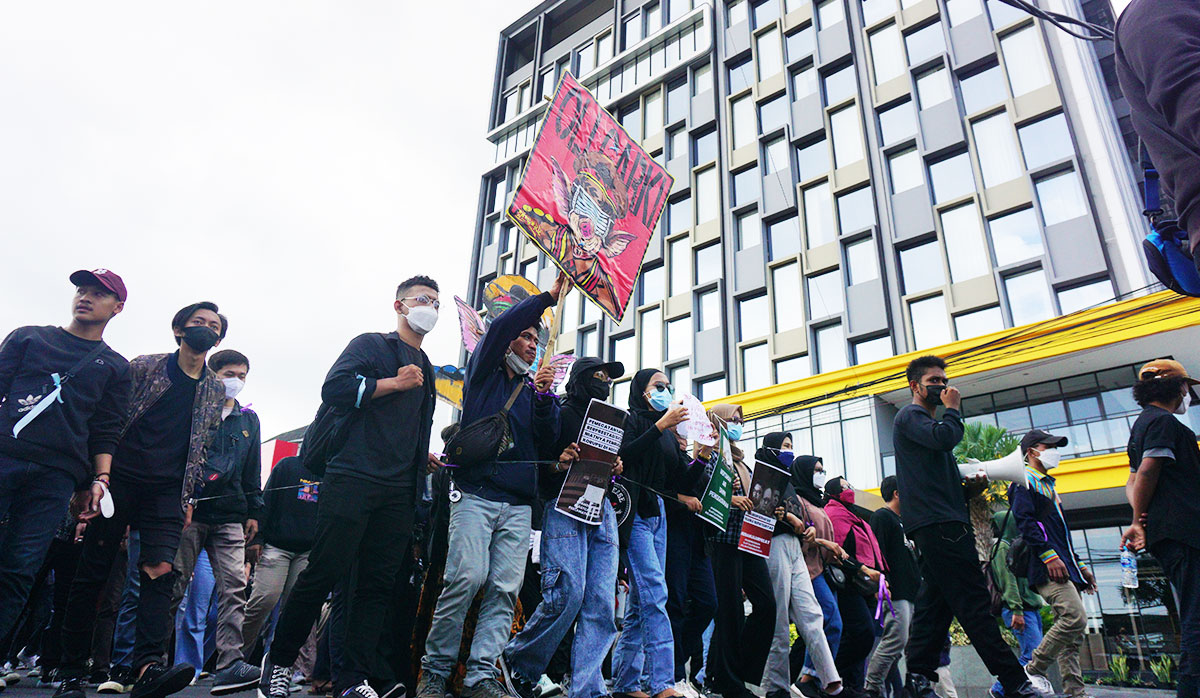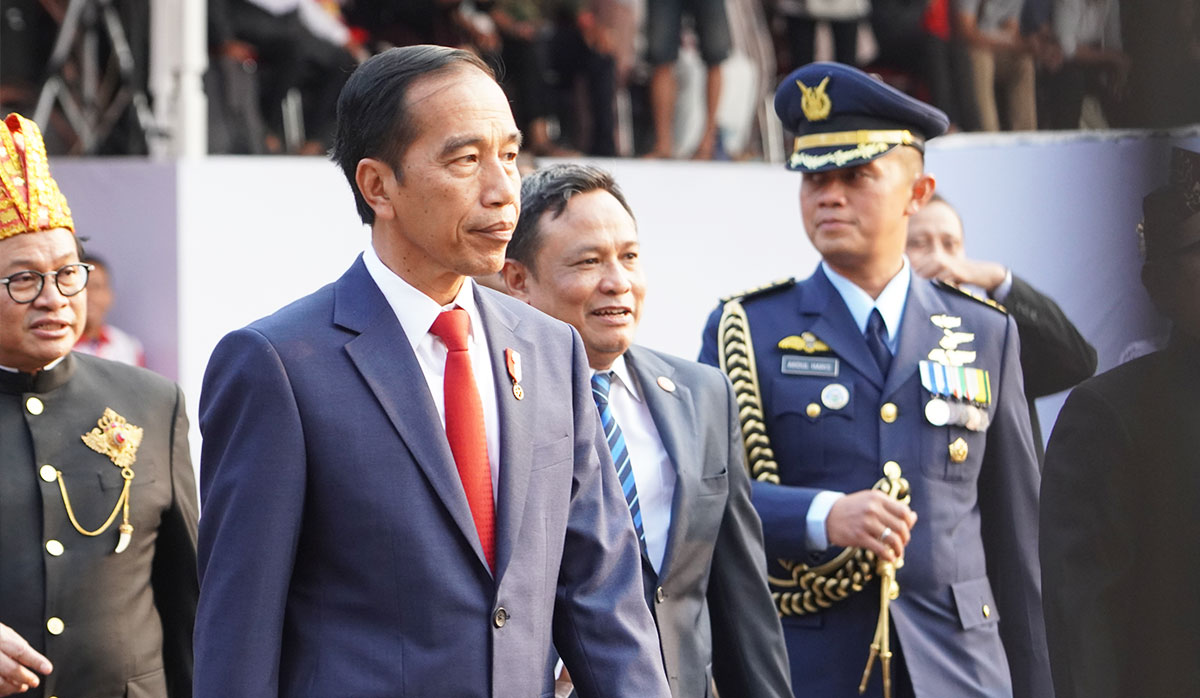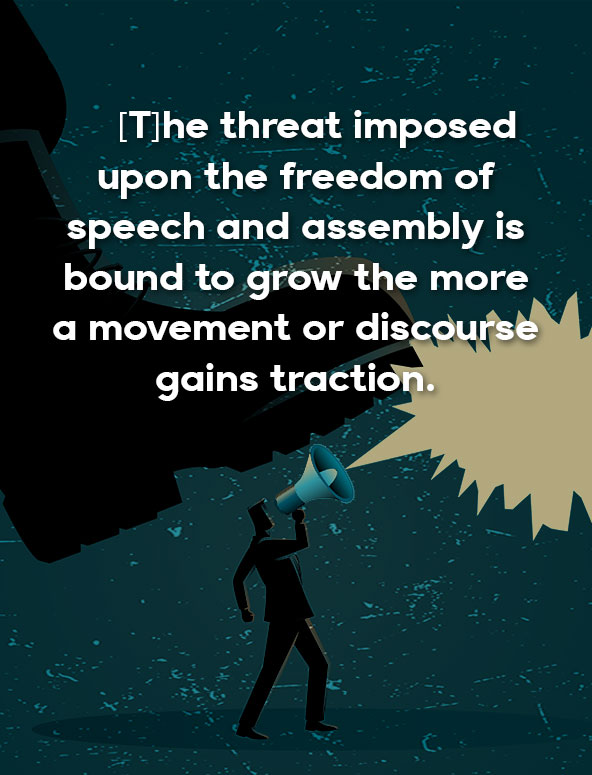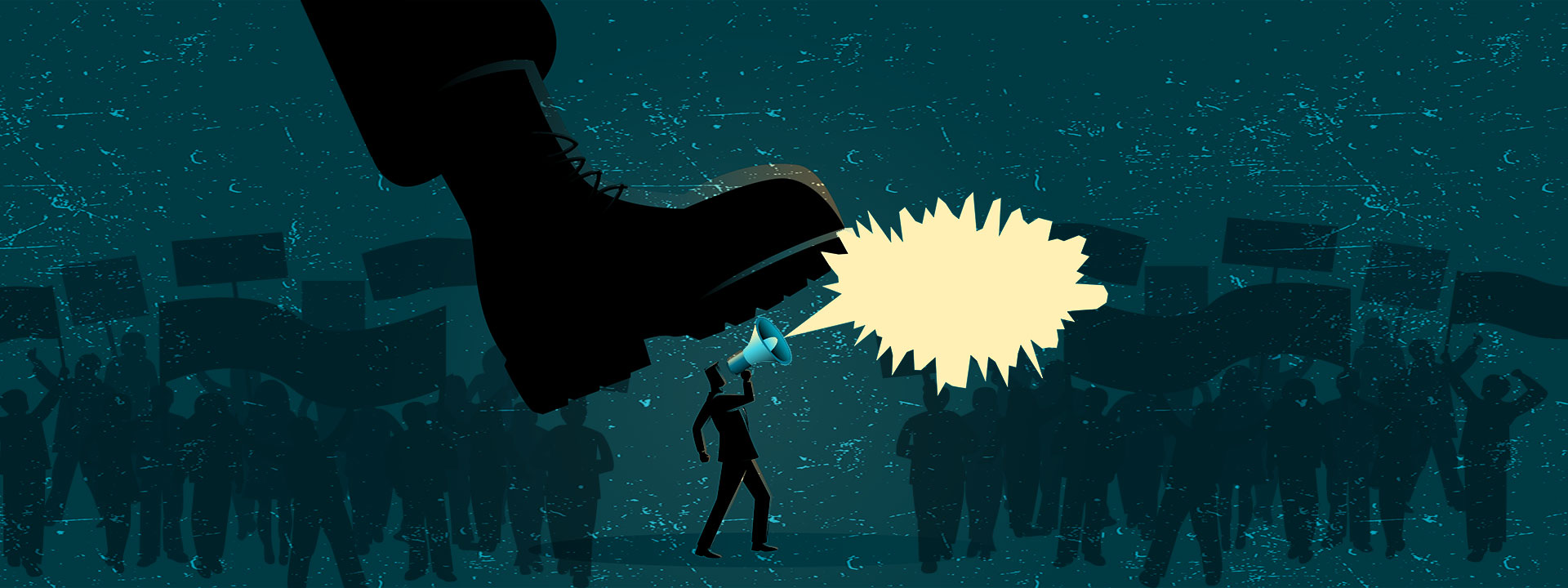In many ways, 2021 largely felt like a year of limbo for Indonesia’s democratic and human rights movement. Shadowed by the magnitude of two protest waves in 2019 and 2020, it seemed that moves to forge alliances, mobilize, and eventually turn the tide of rising illiberalism within the country had come to a halt. Indeed, there was no massive political momentum building upon the #ReformasiDikorupsi protests throughout the year.
Feelings of stagnancy arose when several key government policies that brought people together in opposition under the #ReformasiDikorupsi banner finally took effect in 2021. In early May, the Constitutional Court refused to review the revision of Indonesia’s Anti-Corruption Agency (KPK) Law, which stipulates that investigations toward suspected corruptors will require permission from a “Supervisory Board” appointed by the government. But the penultimate blow arrived days later, when 75 KPK employees were announced to have failed a civic-knowledge test — dubbed a scheme to oust militant investigators working on high-profile cases in the center of power — and discharged from their posts.
Another much-maligned bill, the Indonesian Omnibus Law, was declared by the Constitutional Court in November as “being defective” for failing to meet lawmaking standards within the national constitution. However, that pronouncement was seen largely as a compromise as it merely mandates the government to provide legal ground for the Omnibus lawmaking method within the next two years instead of completely revoking it. Within this time frame, its ratified provisions will still take place — including clauses that unravel social protection mechanisms and perpetuate the precarity of workers, in the name of “cutting red tape” to attract investment.
For sure, there are still protests happening across the country, but so are acts of state repression. In its 2021 annual report, the National Commission for the Disappeared and Victims of Violence (KontraS) recorded 150 acts of violence against freedom of speech and assembly throughout the year. These include the assault toward Papuan protesters in multiple cities as they opposed the renewal of the Papuan Special Autonomy Law, as well as violence and intimidation toward villagers of Wadas, Central Java, who demonstrated against the construction of a dam in their area.

Students protest the Indonesian Omnibus Law and other issues in October 2021. While rallies like this still occur, so do acts of state repression.
Ominous trajectories
Worrying trends have emerged in the meantime. For instance, during Indonesia’s record-high COVID-19 outbreak from June to August, the government appointed 200 military leaders as deputy chiefs in the national COVID-19 task force, while 32,000 military personnel were deployed to enforce security measures on the ground level. Unsurprisingly, the pandemic management during Indonesia’s most devastating COVID-19 wave yet assumed a sharp militaristic nuance, with accounts emerging across the country of people being violently assaulted and criminalized by authorities for breaching public curfews and keeping shops open past mandatory closing hours.
This growing military footprint showcases what political scientist Jun Honna refers to as a “surplus-as-time bomb” within the military structure. Ever since the Reformasi period, the Indonesian National Army had seen enormous public pressure to strictly consign itself within national-defense duties and away from politics. But with high-ranking personnel stripped of extra-military posts and ordered to return to the barracks, the military has faced a crisis of overproduction, i.e. too many decorated officers with too little to do. That has had the government creating demands, real or otherwise, for their services. And so as if the disastrous militarization of West Papua wasn’t enough, the pandemic has provided a pretext to mobilize resources into military coffers.
The question now is: What will the government do with the military problem after the pandemic has subsided? Recently, President Joko Widodo inducted 3,100 military reservists; he plans to recruit up to 25,000 by the end of 2023. The decision to militarize civilians when the number of army personnel is already bloated triggers anxieties that the military is aiming to expand its influence in society — and thus posing a danger of undoing the two decades’ worth of progress in establishing civilian supremacy.
Another trend involves machinations to quell digital dissent. The notorious Electronic Information and Transaction Law looms large in criminalizing critical voices. Last year, journalist Muhammad Arsul was handed a three-month jail term under the law’s defamation clause for reporting corruption in Palopo, South Sulawesi.
Other patterns have also emerged. According to Southeast Asia Freedom of Expression Network Executive Director Damar Juniarto, the number of cyberattacks in Indonesia rose from 141 in 2020 to 190 in 2021. Damar also notes that in 2021, the average number of cyberattacks per month tripled during the height of the public controversy surrounding the dismissal of the KPK employees. The attacks ranged from the hacking of messaging accounts of multiple anti-corruption activists to a Zoom conference being sabotaged with pornography.
“The hacking [toward activists] last year suggests a concentrated effort targeting a specific group of people,” Damar says. “This prompts further questions, as the actors behind these attacks have access to very expensive software and technology.”
“We can no longer designate that hackers or [online] pranksters are behind this as not only do these technologies cost a lot, they also require buying permits from their supplier countries, such as Israel or the United Kingdom,” he adds. “We need to consider that there are one or two groups that receive funding [for their operations], and they have specific people to target over a fixed period of time.”
Meanwhile, a new internet regulation described by the global digital-liberty organization Electronic Frontier Foundation as “may be the most repressive yet” came into effect in November 2020. It enables the government to arbitrarily order any digital platform operating in Indonesia to take down content deemed to infringe on national law. In other words, the government can order, say, Twitter, to delete content that the state sees as “promoting social anxiety and disorder.” Non-compliance may mean non-operation in the country. In 2021, too, all digital platforms were mandated to register, with failure to do so resulting in a ban.

Some Indonesian citizens worry about the growing military footprint of their nation. President Joko Widodo recently inducted more than 3,000 reservists and plans to recruit more by 2023.
Is democratic consensus even still there?
Indonesian democracy thus faces double jeopardy. Firstly, state institutions paramount to the functioning of democracy, such as KPK, are being captured or rendered impotent by forces serving oligarchic interests. Secondly, the threat imposed upon the freedom of speech and assembly is bound to grow the more a movement or discourse gains traction.
In this light, rallying to ensure that those in power “uphold democratic norms” might prove largely ineffective. Instead, what needs to be determined is the kind of leverage civil organizations need to get the government to concede to its demands. And if their current leverage is weak, are there alternative strategies that can be employed to overturn the situation?
“In my opinion, the act of simply demanding change might still be effective for some issues,” says former Indonesian Legal Aid Foundation Director Asfinawati. For example, she says, “even though it was difficult to advocate, the demands to eradicate sexual violence against women nonetheless still contain populist dimensions.” This gives them have a higher chance to be heard, she adds. “Meanwhile, some issues, such as West Papua, have seen no room for compromise. You can see this from which demonstrations tend to end up in beatings and criminalization — and not only to the protesters but their legal aides as well.”
Asfinawati suggests that the public consider demanding change in the political system beyond specific issues.
Political scholars often describe Indonesian politics as heavily centralized upon political parties, each of which is controlled by a conglomerate leader and supported by “cartel” networks. Not only does a presidential nominee have to be supported by political parties, but seats in the House of Representatives are also reserved for party members as well. This prevents independent politicians from ever entering the system and consigns them to the role of external critics.
“For example, we can demand more direct forms of democracy, such as the right to terminate a law through referendums,” Asfinawati says. “We can also demand elected officials to be recalled from their post — not by their party, but by their constituents. But we also need to be mindful so that these mechanisms do not end up as a tyranny of the majority. In a different scenario, an opposition group might also push to reject the draft for an anti-sexual violence bill. This means they need to adhere to a standard of human rights as well. Eventually, we still need to fight over their [policy] substance.”

Dispersing the vanguard role
Despite its potential shortcomings, the idea of enabling people to directly intervene in political processes will enable political action to be more robust due to the actors themselves being “circulated” instead of centralized within select organizations or unions. In the event that several actors are persecuted and criminalized, others can swiftly assume a similar function as the human rights sector itself has become, in a sense, decentralized.
One particular case that captured a lot of public attention last year demonstrates how this can be done. On Oct. 6, 2021, Project Multatuli published a harrowing feature of how police in the Luwu Timur Regency, South Sulawesi, had failed to follow relevant procedures while investigating the alleged rape of three children by their own father.
The article struck a deep chord among Indonesian readers as it provided an amalgamation of many social issues — from the years-long fight to push an anti-sexual violence bill in the House of Representatives, to the perpetual problem of police impunity and incompetence. Ultimately, the piece was disseminated online along with the hashtag #PercumaLaporPolisi — “There’s no use reporting to the police.”
But just hours after the report was published, the Multatuli website suffered Dedicated Denial of Service (DDoS) attacks, rendering it inaccessible. The incident suggested larger forces at play. After all, orchestrated DDoS attacks are known to be expensive and sophisticated, and this was a case in a sparsely populated area 1,650 km away from the capital, Jakarta.
Project Multatuli then decided to syndicate the article to other media outlets, ranging from the independent Marxist publication IndoProgress to major media groups such as Kompas, Tempo, and Detik. This move ensure that the public could still access the report. It also enabled other actors hitherto disconnected from the human-rights sector to take a direct part in it.
The realization that Project Multatuli, a public journalism initiative, is not strictly defined by the Project Multatuli website per se should be considered by other civil organizations. Persecution toward the human rights sector in Indonesia is not going away anytime soon — and until the public comes up with a large-scale political solution to this problem, it is important to imagine ways to democratize the ecosystem.
As social-movement scholar Rodrigo Nunes puts it, the point in making a successful movement lies in figuring out how to make the role of vanguards — people or entities who direct the attention and efforts within a movement — be “dispersed” so that anyone can assume this function for a period of time. Building such a robust ecosystem might prove to be key in future endeavors. ●
Eduard Lazarus is a Jakarta-based journalist and editor covering media and social movements.



















